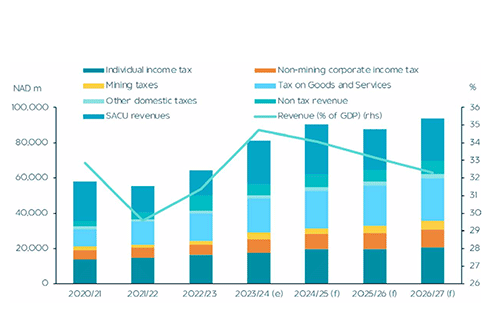This year’s national budget, tabled last week, is underpinned by three priority policy pillars, namely stimulating domestic demand, accelerating investments in productive public infrastructure and cultivating fiscal prudence. These priority areas surfaced when finance and public enterprises minister Iipumbu Shiimi tabled the FY24/25 national budget in parliament last Wednesday ahead of a key election year, amidst an ongoing drought, sluggish non-mining growth, and a less supportive global backdrop.
In her analysis of the recent figures, FNB Namibia economist Ruusa Nandago noted that the finance ministry expects stronger economic growth of 5.6% year-on-year (y/y) in 2023, 4.0% in 2024, and 3.9% in 2025, driven by oil and gas exploration and uranium production. These numbers are in line with FNB’s expectations.
Also, fiscal revenue is expected to increase by 11.5% y/y to N$90.4 billion in FY24/25 from N$81.1 billion in FY23/24 on the back of higher Southern African Customs Union (SACU) receipts, personal income tax, non-mining company tax and value-added tax (VAT).
When tabling the budget, Shiimi unveiled a number of tax policy reform measures intended to provide relief to both individuals and corporates, and
to improve administrative efficiency.
“Expenditure is projected to rise by 11.9% to N$100.1 billion in FY24/25, from N$89.5 billion in the prior year, on the back of civil service wage increases, higher welfare spending, an increase in development spending and higher interest rate costs,” Nandago stated.
She added that given the revenue and expenditure dynamics, the budget deficit for FY24/25 is estimated to widen to N$8.9 billion in nominal terms, from N$7.8bn in FY23/24, but it will remain unchanged relative to GDP at 3.2%.
“Similarly, the total debt stock for FY24/25 will increase in nominal terms to N$165.8 billion from N$154.2 billion in FY23/24. Relative to GDP, debt is estimated to reach 62.5% of GDP in FY23/24, down from 66.2% in FY22/23. Going forward, the ratio is expected to continue decreasing to 60.1% in FY24/25, 56.8% in FY25/26, and 56.4% in FY26/27. The significantly lower ratio compared to previous estimates is due
to strong nominal GDP growth, outpacing the increase in debt stock,” Nandago emphasised.
Moreover, in its review of the national budget, FNB noted that compared to the N$78.9 billion forecasted for FY24/25, the finance ministry now aims to collect N$90.4bn in FY24/25, which is an 11.5% y/y increase from the revised estimates for FY23/24.
On the domestic front, FNB pointed out that personal income tax is projected
to increase from N$17.6 billion in FY23/24 to N$19.7 billion in FY24/25, VAT from N$17.4 billion in FY23/24 to N$19.5bn in FY24/25, and non-mining company tax from N$7.6bn in FY23/24 to N$8.5bn in FY24/25.
This, the bank’s review stated, is a result of anticipated improvement in general economic activity, key tax policy reform, civil service wage increases, higher welfare spending, and the
ongoing efforts by the Namibia Revenue Agency (NamRa) to enhance domestic revenue mobilisation, for instance by addressing undeclared imports. Over the medium-term expenditure framework (MTEF) spanning from FY24/25 to FY26/27, revenue growth is expected to average 5.1%.
“We note that while SACU revenue forecasts have been revised higher in FY24/25, a reversal in the growth of these receipts is expected in FY25/26 to N$22.8 billion – an 18.6% y/y decline from FY24/25. This is in line with a decline in SACU revenue transfer forecasts tabled in the South African medium-term budget policy
statement.
SACU transfers to member countries are projected to decline from R85.6bn in FY24/25 to R77.2bn in FY25/26, largely on the back of lower customs duties’ forecasts. Given that SACU receipts are the largest single source of revenue for the government (27.5% of total revenue over the MTEF), a slowdown bodes ill for the overall fiscal revenue position. Should this revenue profile worsen, it will also have implications for the contribution to the sinking fund set up for debt redemptions and the position of international reserves,” the FNB review stated.
Meanwhile, on the non-tax revenue side, dividend payments totalling N$3.2 billion are expected from Namibia Post and Telecom Holdings Company (NPTH), the Mobile Telecommunications Company (MTC), the Bank of Namibia, Namibia Desert Diamonds (NamDia), and the Namibia Ports Authority (NamPort). Also, the finance ministry highlighted the softening of the diamond market as a key risk to fiscal revenues.


